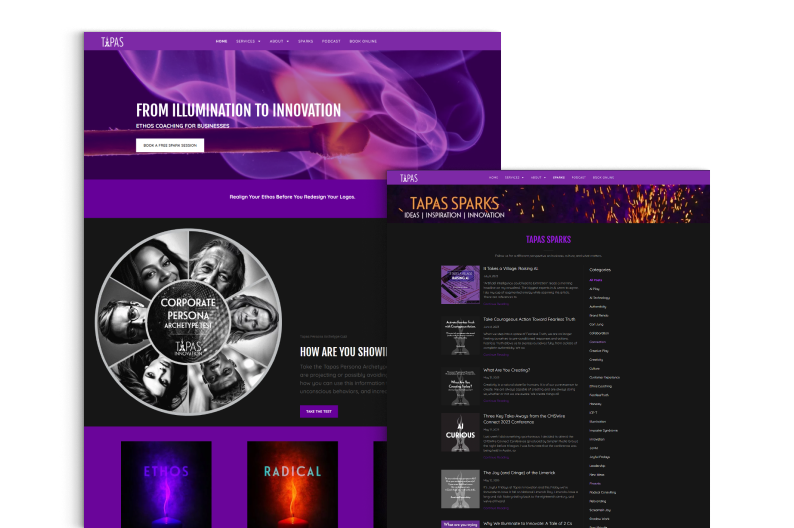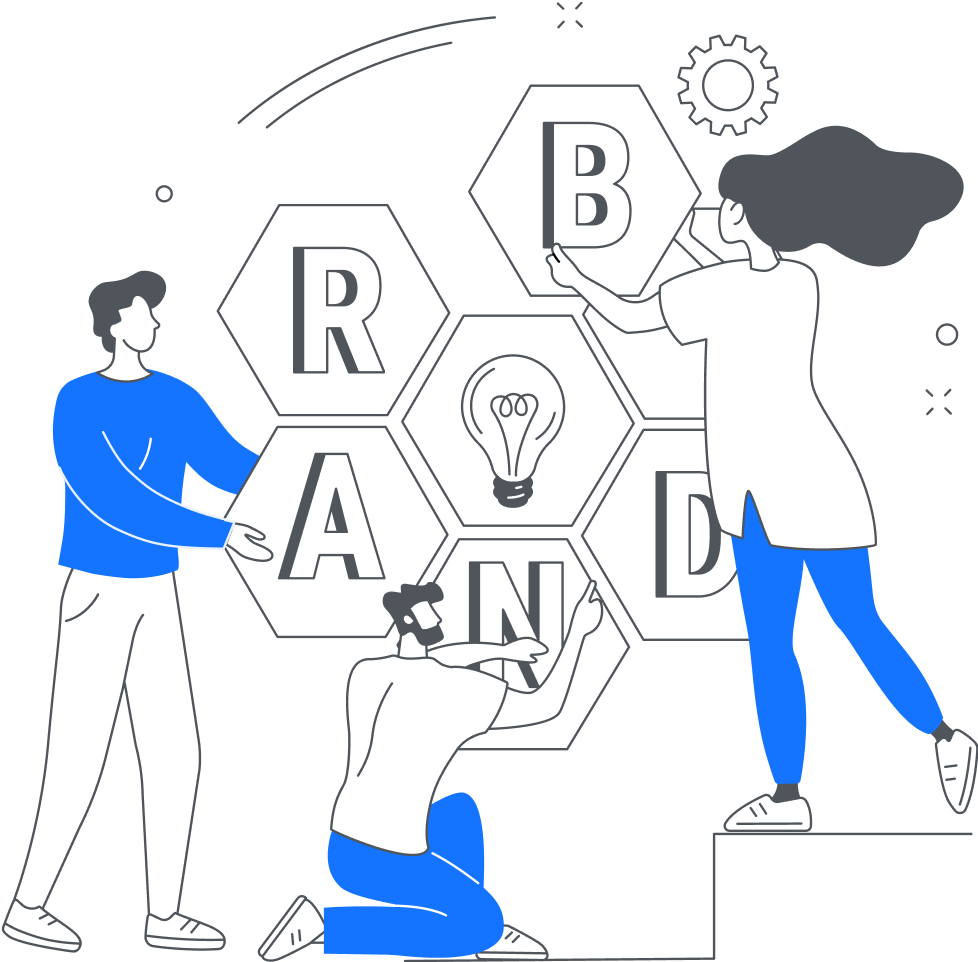Case Study
Tapas Innovation
This project involved building and optimizing Tapas Innovation’s WordPress-based platform to support their ethos coaching, consulting, and creative services. The aim was to deliver a seamless digital experience that aligns with Tapas’s core values, supports client engagement, and scales as new offerings (coaching, consulting, brand services, media) evolve. The solution unifies content, client funnels, and service delivery under a branded, high-performance WordPress architecture.

Case Study
Introduction
Tapas Innovation is a coaching, consulting, and creative services firm that focuses on internal alignment (ethos), emotional intelligence, leadership clarity, and brand expression. Their service lines include individual coaching, organizational consulting, and creative branding/identity work. Before this project, their digital presence was primarily informational, spread across content pages, quiz modules, and blog posts. The goal was to transform that into a cohesive service delivery platform built on WordPress—serving visitors, clients, and the internal Tapas team in one unified experience.
Key stakeholders include:
- Individuals seeking personal or professional transformation
- Organizations and leadership teams aiming for culture or brand alignment
- The internal Tapas team (coaches, designers, content creators)
- Prospective clients engaging via content, quizzes, and service packages
Project Name / Code:
Ethos WordPress Platform (EWP)
Category:
Coaching / Branding / Creative Services / Digital Platform
Location
United States
Project start date
2024

Project Name / Code:
Ethos WordPress Platform (EWP)
Category:
Coaching / Branding / Creative Services / Digital Platform
Location:
United States
Project Start Date:
2024

About
Problem Statement
While Tapas Innovation had rich content, coaching frameworks, and creative methodology, their WordPress site was largely a marketing presence. It lacked integration for seamless client journeys, onboarding, assessments, service delivery modules, and scalable content management. Challenges included:
- Disconnected quiz / assessment tools not tightly connected to user profiles
- Difficulty managing coaching / consulting product offers and packages
- Content, blog, podcast, and service pages operating in isolation
- Harder to evolve service lines or launch new offerings without heavy redevelopment
A more integrated WordPress architecture was necessary to remove friction, strengthen brand coherence, and support future scaling of service modules.
Objectives
- Build a WordPress platform that supports Tapas’s coaching, consulting, and creative service operations.
- Integrate persona/ethos quizzes / assessments into client flows, tied to user accounts.
- Enable modular service pages, coaching package management, and clear funnels.
- Maintain a content-first architecture (blog, podcast, resources) with easy authoring.
- Ensure the site is performant, secure, and ready for future expansion.


Implementation
Because Tapas Innovation’s site is built on WordPress, the implementation leveraged WordPress’s strengths plus custom development:
Hosting & Infrastructure:
Deployed on managed WordPress / cloud hosting with SSL, caching, and CDN layers for performance.
Regular backups, security hardening, and plugin updates to maintain stability.
Database / Storage:
WordPress MySQL (or MariaDB) as the core data store for pages, posts, users, metadata.
Custom tables or custom post types (CPTs) for assessments, coaching packages, service modules.
Media assets (images, audio, video) stored in WordPress media library or external storage (e.g. S3) behind CDN.
Frontend / UI:
A custom WordPress theme or child theme tailored to Tapas’s brand identity (fonts, styling, layout).
Embedded interactive modules (e.g. for quizzes or assessment) using JavaScript (React / Vue embedded in WordPress) or via shortcode / plugin.
Responsive design across desktop and mobile, ensuring all modules and service flows are seamless.
Backend / Plugins / Custom Code:
Custom plugin(s) to manage quizzes / persona archetype assessments, linking results to user profiles.
Custom plugin or modules for coaching / package offerings (pricing, booking, package pages).
Integration with scheduling (e.g. Calendly) for “free spark session” booking.
Custom post types or taxonomy for service lines (coaching, consulting, creative) to allow flexible content and modular services.
Use of WordPress REST API or custom endpoints to power interactive front-end modules.
Blog, podcast / “vodcast” modules using built-in WordPress post types or custom ones.
Role-based access control, user accounts, and private client pages or gated content if needed.
Key Takeaways / Challenges:
Translating abstract, emotionally nuanced coaching and ethos concepts into structured digital modules.
Ensuring quizzes / assessments feel intuitive and connected, not isolated.
Balancing performance and flexibility—complex modules in WordPress can slow things if not optimized.
Keeping the site’s content components (blog, podcast) flexible for ongoing publishing, while linking them into the broader service flow.

Results / Outcomes
KPIs / Metrics:
- Higher conversion from visitor → free session / quiz engagement
- Increased engagement with quiz / persona assessment modules
- More streamlined visibility and access to coaching / consulting offerings
- Better alignment between brand messaging and client face-to-face services
Before & After Comparison:
- Before: The WordPress site was mostly a brochure / content site, with scattered quiz links and service pages.
- After: The site became an integrated service delivery platform, blending content, assessments, coaching offers, and client flows in a coherent architecture.
Key Improvements:
- Clearer, easier funnel from homepage → quiz → consultation → service package
- Easier content publishing (blog, podcast) without breaking flow
- Stronger brand experience and consistency across pages and modules
- Foundation ready for launching new services or membership / community modules
Technologies
Technologies / Tools that We used to achieve this task

